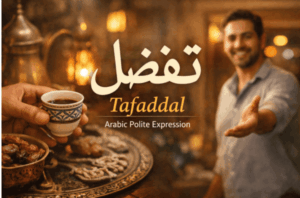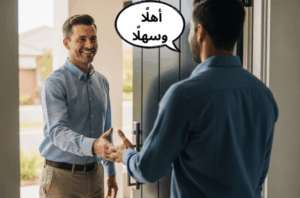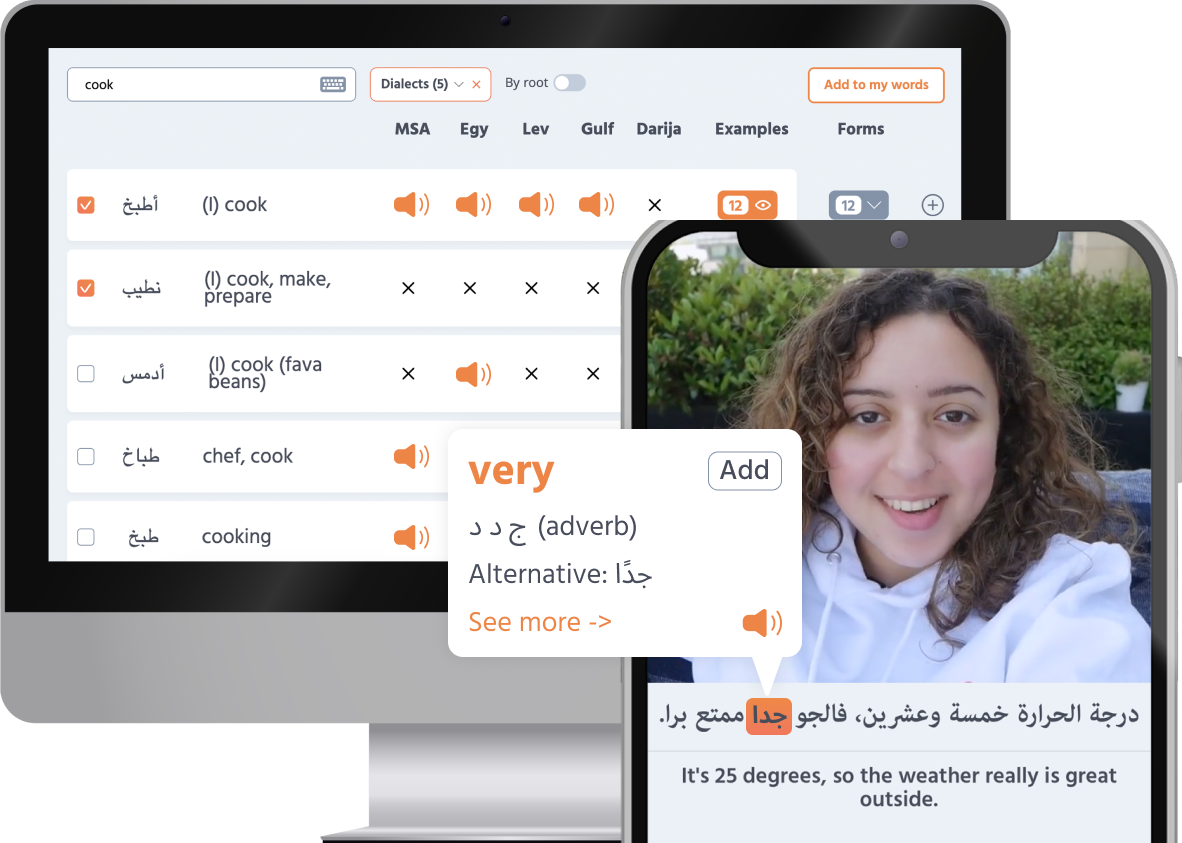Learning Arabic is full of challenges, whether it’s due to its complex grammar or the uncommon sounds not found in other languages. But there’s another challenge that every Arabic learner faces: choosing which Arabic dialect to learn. Playaling is here to help you decide!
Arabic is divided into Classical Arabic, the language of the Quran, and Modern Standard Arabic , which is the written and official language used in schools, universities, newspapers, books, and official communication on the one hand. There is also Educated Spoken Arabic , which is a formal spoken Arabic. On the other hand, there are various Arabic dialects , which vary from one country to another and can even differ within the same country from one region to another. This is the language of daily life in Arab countries, the language people use at home as well as on the street. Modern Standard Arabic is taught to children in nurseries and schools, but the local dialect is the first language children learn from their parents.
Why learn spoken Arabic? Learning at least one Arabic dialect is crucial for anyone looking to truly immerse themselves in the Arabic-speaking world beyond the confines of formal environments. Modern Standard Arabic (MSA) serves well for reading newspapers or engaging with media, but it falls short in everyday interactions where dialects reign supreme. Dialects such as Egyptian, Levantine, or Maghrebi Arabic are the true vehicles of daily communication, embodying the rich, diverse cultural expressions and colloquialisms unique to each region. By learning a dialect, one gains not just linguistic skills but also an invaluable cultural passport, enhancing personal and professional relationships and providing deeper insights into local customs and social nuances. This makes the learning of a dialect not just an academic exercise, but a gateway to genuine integration and understanding in a way that MSA alone cannot provide.
So, if you’re wondering which Arabic dialect to learn, let’s dive in and explore this together!
Which Arabic dialect should I learn? The answer depends on your personal goals and what you hope to get out of learning the language. Here are some of the main Arabic dialects and reasons why (or why not) you should choose to study them:
Why choose Levantine dialect? Easy communication: With around 50 million speakers in Syria, Lebanon, Jordan, and Palestine, the Levantine dialect is a hit across the Middle East. Its popularity in songs and shows means you’ll generally be understood by most Arabs, no matter where you are.
Dive into culture : Want to immerse yourself in Middle Eastern culture? Learning the Levantine dialect is like stepping into the heart of the region. Thanks to popular TV series, songs, singers like Fairouz, and the poetry of Nizar Qabbani and Mahmoud Darwish, the Levantine dialect is recognised by many people living outside areas where it is spoken regularly. Additionally, the plays of the Rahbani brothers and Syrian TV series like “باب الحارة
(The Neighbourhood’s Gate)”, “مرايا
(Mirrors)” and “Al-Khawali
(Old Times )” are popular across the Arab World, gracing screens in every Arab household and leaving behind a mark of Levantine culture.
Smooth transition : Planning to tackle Modern Standard Arabic later on? Good news – the Levantine dialect is a great stepping stone. Or conversely, if you already know some Modern Standard Arabic, it can make your language learning a bit easier since there’s a lot of overlap.
One aspect of similarity is that the pronunciation of most letters is similar to their pronunciation in Modern Standard Arabic, and the way letters and words are spoken makes this dialect easy to understand if you know Modern Standard Arabic. Here are some similarities in vocabulary between Levantine dialect and Modern Standard Arabic (Note that all the phrases mentioned below are for addressing the masculine form):
English How are you? Where are you from? What is your name? Very I love you MSA كيف حالك؟
من أين أنت؟
ما اسمك؟
كثير
أحبّك
Levantine كيفك
من وين انت؟
شو اسمك؟
كتير
بحبّك
Get free Arabic videos with interactive captions for your level
Get free videos
Why choose the Egyptian dialect? Egyptian Arabic has been influenced by Coptic, which was the original language of the Egyptians before the Arab conquest. More recently, it has had some influence from other languages such as French, Italian, Greek, Turkish, and English.
Widely spoken : With over 100 million Egyptians speaking it, the Egyptian dialect is the most commonly spoken dialect in the Arab world. However, as its name suggests, most of its speakers are concentrated in just one country – any guess which one? 😉
Massive influence : Egyptian cinema and theater have a huge impact and most Arabic songs are sung in the Egyptian dialect, making it extremely popular.
Some of the most famous Egyptian movies in the Arab World are: ” الأرض
(The Land)”, “عمارة يعقوبيان
(The Yacoubian Building)”, and “عسل إسود
(Molasses)”..
When it comes to Egyptian theater, everyone in the Arab world knows about the following Egyptian plays: “مَدْرَسِة الْمُشاغِبين
(The School of Trouble Makers)”, “شَاهِد مَاشَفْش حَاجَة
(The Witness Who Didn’t See Anything)”, and “ريّا وسْكِينَة
(Rayya and Sakina)”. On Arab Mother’s Day, the song سِتْ الحَبَايِب
(Mother of Beloved Ones) by Fayza Ahmad is played in almost every Arab house. Every Arab has listened to Um-Kulthoum, Abdel Halim Hafez , Mohammad Abdel Wahhab, and Amr Diab . Check out this video to see how other Arabs learnt the Egyptian dialect .
If you learn the Egyptian dialect, this library of cultural output will open before you, and you can share in the cultural heritage that so many Egyptians are proud of.
Familiarity : Millions of Arabs understand Egyptian Arabic, making it a powerful means of communication. The reason for this can be attributed to Egyptian cinema and television programs that have spread since the beginning of television broadcasting in the Arab world and have maintained their popularity and spread to the present day, in addition to Egyptian literature, theater, and songs. However, as technology has developed, Egypt has lost its monopoly, and now you will find many songs and TV shows in other dialects.
That being said, the Egyptian dialect continues to hold a nostalgic place in the hearts of many Arabs because it reminds older generations of the films they grew up with. Disney provoked debate in the Middle East in 2013 when it decided to dub its world famous animations in Modern Standard Arabic, whereas up until that point they were dubbed in the Egyptian dialect. This change was reversed following an outcry across the Middle East, but kindled a debate in Arab society around the prominence of Egyptian dialect.
Forging connections : If you are planning a trip to explore Egypt’s rich history and culture, learning the Egyptian dialect is a smart choice. If you hope to explore Egypt like a local and go off the beaten tourist track, then knowing the Egyptian dialect is useful. And if you want to connect with Arabs from various countries, the dialect’s widespread usage makes it an excellent option.
Richness of influence: Thirteen foreign languages form the roots of more than 1500 words in Egyptian Arabic. These influences include Greek, Roman, Turkish, Persian, English, French, and Coptic, the ancient language of Egypt. Most of the language, however, overlaps with standard Arabic with minor differences in vowels and pronunciations.
Why choose the Gulf dialect? Wealth : Gulf Arabic is spoken in the Gulf Arab countries, including Saudi Arabia, the United Arab Emirates, Qatar, Oman, Kuwait, and Bahrain. The Gulf region is known for its oil wealth, attracting many people who aspire to work there.
Integration and enjoyment : If you’re planning to travel to the Gulf for work, learning the Gulf Arabic dialect could be useful for better integration into the local community. It would help you participate in Gulf culture, customs, and traditions.
If you’re not specifically interested in Gulf Arabic, you might be best advised to choose to focus on another dialect, as it’s not particularly popular outside the Gulf region, and the Gulf itself has a relatively low population. Furthermore, the Gulf region is home to a high number of foreign migrants, including many Arabs from other Arab countries, all of whom speak their own dialects. In some Gulf countries, such as the UAE, a mix of Arabic, English, Hindi, and Urdu is spoken in daily life.
The Gulf dialect has some special characteristics. For example, the letter ق
can sound like ‘q’ in ‘Qatar’
, ‘g’ in ‘goat’
, or ’j’ in ’judge’, depending on the sub-dialect or context.
When it comes to the letter ‘ك’
, it’s often pronounced like the ’ch’ in ’chat.’
Why choose Darija? Exploring the Maghreb region : If you’re interested in the Maghreb region, which includes Morocco, Algeria, Tunisia, and Libya, whether for tourism or connecting with the local population, learning Darija is your best bet.
Darija, or Maghrebi Arabic , varies across Morocco, Algeria, Tunisia, and Libya. While it shares a common base and is mutually intelligible to some extent, each country has its unique version of Darija with distinct vocabulary, pronunciation, and sometimes grammar.
Unique and different : Maghrebi Arabic differs significantly from Levantine Arabic or other dialects in the Arab East. It has its distinct flavor and expressions that make it fascinating to learn and use. This difference is what makes Darija difficult to understand for Arabs from other regions.
Influence from other languages: You might be surprised, but there are many terms and words borrowed from French, Italian, and Spanish in Darija, which makes learning this dialect slightly easier if you speak any of these languages.
For example, the words كوزينة
(kitchen) and سبّاط
(shoes) and بوڨاطو
(lawyer), come from the Spanish words ‘cocina’
, ‘zapato’
, ‘abogado’
, respectively.
The words فرتونه
(luck), and طابيلة
(table) are from the Italian words: fortuna and tabella.
While each of the words: فُورْشِيطَا
(fork), مِيزِيرْيَا
(poverty), بلاصة
(plaza), and باكو
(paquet) are originally from the French words: fourchette, misère, place, baquet.
There are also many Amazigh words in Darija, such as like فْكْرُون
(turtle), شْرْجْم
(window),الساروت
(key), and المش
(cat). The Amazigh, also known as Berbers, are an indigenous ethnic group native to North Africa. Their presence in the region dates back thousands of years, with a rich history that predates the Arab conquests of the 7th century AD.
Both French and Amazigh are commonly spoken in the Maghreb, meaning that the area is a melting pot of language exchange. The Amazigh language is also one of the official languages in both Morocco and Algeria. In recent years, there has been a concerted effort by young Moroccans to move away from speaking French (the language of the former colonial power) in favor of reclaiming their Moroccan roots. Therefore, learning Darija will give you privileged access and insight into Maghreb culture and society.
Why choose Iraqi dialect? Rooted in Mesopotamia : Iraqi Arabic, like many Arabic dialects, is a rich tapestry of interconnected regional varieties broadly understood by residents of Iraq’s diverse Arabic-speaking provinces. Its presence extends to parts of southeastern Turkey, Iran, Syria, and Kuwait.
Interest in Iraq : If you’re interested in Iraq and considering living there, learning Iraqi Arabic is a great idea. Iraqi music is also becoming more popular in the wider Arab World, and along with it, so is its dialect! Some of the most famous Iraqi singers, whose songs have spread across the Arab world, achieving widespread fame and leaving an unforgettable impact on the hearts of every Arab, are Kazem Al-Saher, Saadoun Jaber, Ilham Al-Madfai, Nazem Al-Ghazali, and Hatem Al-Iraqi.
After all that, it’s evident that only you can decide which Arabic dialect is best to learn. However, if your interest lies in general communication with Arabs, if you don’t want to limit yourself to a specific location or purpose, and if you aim to learn Arabic for casual rather than official, written, or educational purposes, then both Levantine and Egyptian dialects are most useful due to their widespread intelligibility across Arab countries.
Oh, and by the way… If learning Arabic at your own pace, with fun, real-world videos sounds like your style, then Playaling could be exactly what you’re looking for!
With Playaling, you’ll dive into any major Arabic dialect or MSA. Our diverse range of videos has it all—from everyday conversations and cultural moments to music videos, TV and movie clips, influencer content, news broadcasts, and inspiring talks.
Our interactive captions let you tap any word for instant translations, context, and audio. So, real Arabic content becomes accessible with just a click. Miss something? No problem—rewind and listen as often as you need, or hover over subtitles for quick definitions.
Spot a word you want to learn? Save it to your personalized word set, or dive into curated sets for focused practice and easy review.
Interactive exercises let you dive in and practice what you’ve learned.
Need to look something up? The Audio Dictionary has you covered with clear human pronunciations and real world examples.
It’s a learning experience that keeps you engaged, bringing authentic, real-world Arabic closer to you every step of the way.
Give it a try!









